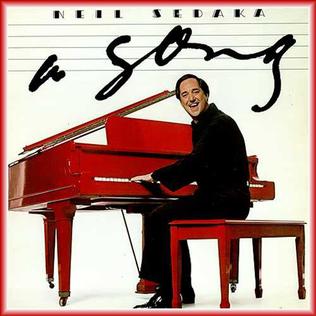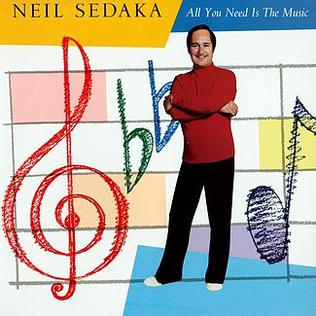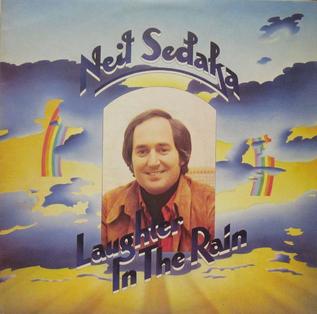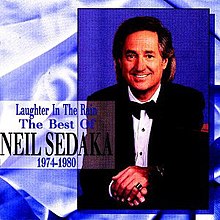
Neil Sedaka is an American pop singer, pianist, composer and record producer. Since his music career began in 1957 as a short-lived founding member of the Tokens, he has sold millions of records as an artist and has written or co-written over 500 songs for himself and others, collaborating mostly with lyricists Howard Greenfield and Phil Cody.
Eruption were a British disco, R&B and soul recording act in the 1970s and 1980s. They are best known for their covers of Ann Peebles's "I Can't Stand the Rain" and Neil Sedaka's "One Way Ticket", which were big disco hits in 1978 and 1979, respectively.

"Laughter in the Rain" is a song composed and recorded by Neil Sedaka, with lyrics by Phil Cody. It includes a 20-second saxophone solo by Jim Horn. Cody claims to have written the lyrics in about five minutes after smoking marijuana and falling asleep under a tree for a couple of hours.

"Love Will Keep Us Together" is a song written by Neil Sedaka and Howard Greenfield. It was first recorded by Sedaka in 1973. American pop duo Captain & Tennille covered the song in 1975, with instrumental backing almost entirely by “Captain” Daryl Dragon, with the exception of drums played by Hal Blaine; their version became a worldwide hit.

The Hungry Years is an album by Neil Sedaka, the title of which is an eponymous track from the album. It was released by The Rocket Record Company in 1975.

Live at Royal Festival Hall is an album by Neil Sedaka with the Royal Philharmonic Orchestra was released on the Polydor Records label in 1974. It was recorded on February 2, 1974, at the Royal Festival Hall in London.

Solitaire is a 1972 album by American singer-songwriter Neil Sedaka. The album, released after a successful English tour in early 1972, marked the comeback of Sedaka after a 10-year absence from the charts. Three singles were lifted from the album, "Beautiful You", "That's When the Music Takes Me", and "Dimbo Man". The album's title track, "Solitaire", later became a hit single for Andy Williams (1973) and The Carpenters (1975).

The Tra-La Days Are Over is a 1973 album by American singer-songwriter Neil Sedaka. The album was the second to be produced at Strawberry Studios in England in collaboration with Graham Gouldman, Lol Creme, Kevin Godley and Eric Stewart, who had formed the band 10cc since their first joint venture with Sedaka on Solitaire (1972).

Sedaka's Back is a compilation album by American singer-songwriter Neil Sedaka. The record, composed of selections from his previous three albums, which had been released only in the UK, was released on Elton John's label, The Rocket Record Company, in 1974. Three singles were released from this album: "Laughter in the Rain", "The Immigrant" and "That's When The Music Takes Me." The latter two songs were both Top 40 hits. Also included were songs that were turned into hits by other artists: "Solitaire" and "Love Will Keep Us Together". The album reached No. 23 on the US Billboard album charts and was certified Gold for shipping half a million sales.
The following is a comprehensive discography of Neil Sedaka, the American singer.

The Other Side of Me is the thirty-fifth studio album by American pop singer Andy Williams, released in the summer of 1975 by Columbia Records and including the 1973 recording of "Solitaire" from his album of the same name alongside 10 original recordings, four of which were also by "Solitaire" composer Neil Sedaka. After unsuccessful attempts to leave behind the formulaic album genre of easy listening covers of pop hits, The Other Side of Me offered a compromise by filling half of the sides with material that was popularized by other artists and the other half with either new or obscure selections.

The Many Sides Of Neil Sedaka is a 1978 compilation album released by RCA Victor Records containing the works of pop singer Neil Sedaka. The album contains some of Sedaka's lesser-known works in the period from 1958-1965, although three of the songs on the album were charting hits at the time of their original release.

Steppin' Out is a 1976 album containing the works of Neil Sedaka. In America it was the third and final album of a trilogy of albums issued by The Rocket Record Company. Outside America Steppin' Out was issued on the Polydor label. In 1998, the Varèse Sarabande label reissued Steppin' Out and included four bonus tracks.

Overnight Success is a 1975 studio album containing the works of Neil Sedaka. It was released in the UK and throughout Europe on the Polydor label, and Australia on the Rainbow label. Later that same year, in the US, most of this album was issued under the title The Hungry Years, with two songs from the British album replaced on the American album.

A Song is an in-studio album containing the works of American pop star Neil Sedaka. It was produced by George Martin and released in 1977 on the Elektra label in the US, marking the beginning of Sedaka's association with Elektra, which would run through 1981. Outside of the US, A Song was released on the Polydor label.

Neil Sedaka: Now is a studio album by American songwriter and pop star Neil Sedaka. It was released in 1981 on the Elektra label, and it was the last Sedaka album to be released on that label. As with other Neil Sedaka albums of that period, it was released in Europe on the Polydor label.

"Next Door to an Angel" is a rock and pop song written by Neil Sedaka and Howard Greenfield and recorded by Neil Sedaka in 1962. It was issued by RCA Victor Records. It reached No. 5 on the Billboard Hot 100 in late 1962. "Next Door to an Angel" also went to no. 19 on the Hot R&B Singles chart. It was Sedaka's last appearance on the American Top 10 until "Laughter in the Rain" in late 1974.

Neil Sedaka's Greatest Hits is a 1977 compilation album consisting of the works of American pop star Neil Sedaka. It contains his most popular songs from his trilogy of Rocket albums from 1974-1976. It was released by The Rocket Record Company in the US; outside the US it was released on the Polydor label.

All You Need Is The Music is a 1978 in-studio album containing the works of the American pop-singer Neil Sedaka. It was released in the US on Elektra Records, his second album for the company. Outside the United States it was released on the European-based Polydor label. It was conducted and arranged by Artie Butler and engineered by Ron Malo.

Laughter in the Rain is a 1974 British album by American pop star Neil Sedaka. It was released in the UK in 1974 on the Polydor label. The album was recorded in the US at Clover Recording Studios in Hollywood over the course of several sessions from November-December 1973. The album entered the UK charts on 22 June 1974 rising to No.17 and stayed in the charts for 10 weeks. The album gained a Silver Certificate from the BPI.















